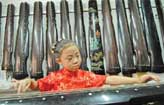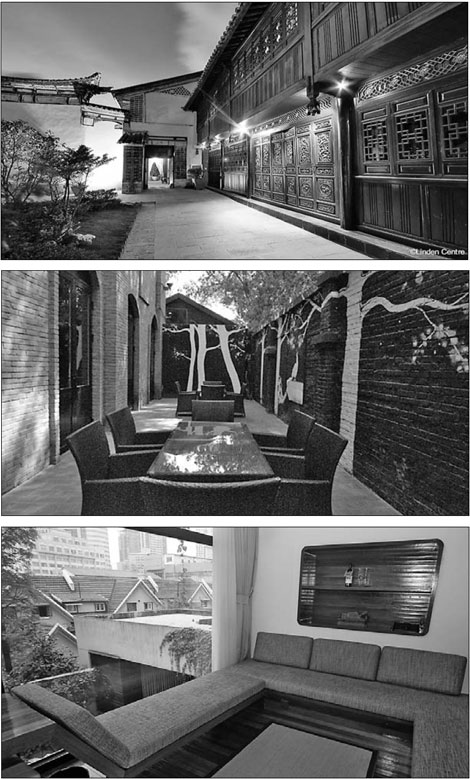Art
Intimate trends
Updated: 2011-07-31 08:30
By Tiffany Tan (China Daily)
|
The concrete walls of the inner courtyard of the Waterhouse at the Old Docks in Shanghai retained much of the original material, including the distressed wooden shutters. Provided to China Daily |
Today's travelers are looking for style. They want small, personalized hotels that appeal to their sense of adventure, and whose corporate philosophy fits with their value systems. Tiffany Tan looks at the rise of the boutique hotels.
Last October, Meike Winnemuth won Germany's version of Who Wants to Be a Millionaire. Six months later, she was in Shanghai, on one of the stops during a full year of traveling. During her one month in the city, Winnemuth stayed in a 26-room hotel and then a one-bedroom apartment. Interesting choices for someone who had just won about $700,000.
"If I stay at hotels, I am always looking for places with a relaxed atmosphere," Winnemuth, a journalist, said in an e-mail from Honolulu, her next stop after Shanghai.
So in Shanghai, she picked URBN, on a friend's recommendation. This is China's first carbon-neutral hotel, which gives guests a chance to offset their flights by buying carbon credits.
Located in a former post office and the factory warehouse next door in central Shanghai, URBN features interiors made entirely of locally sourced or recycled materials, such as wood from decommissioned ships. The hotel has also allotted 6 square meters of green space each guest, including a courtyard restaurant and an exclusive rooftop garden.
"My friend said - and she was right - that this would be a home away from home. I liked that it was a small hotel I prefer that to the big chain hotels. It's much more personal."
Winnemuth, 50, is among a new breed of travelers who's helping to popularize boutique hotels in China. Industry insiders describe these customers as frequent travelers who are reacting against the uniformity of most brand-name chain hotels.
"The more people travel, the more they value unique, specialized and personalized service," said Laurent Vernhes, CEO and co-founder of Tablet, a New York City-based hotel review and booking website. "Boutique hotels originated in the USA where the chains had completely commoditized the market."
"Boutique" is a term used loosely to describe big and small properties (some have more than 200 rooms), places that emphasize cutting-edge or traditional design and those that lie in the heart of a city or in the bosom of Mother Nature.
But whether through aesthetics, geography or service, they're all driven to leave a distinctive mark on guests.
Shanghai has seen a growth of such hotels, including the Waterhouse at the Old Docks, right next to the famous "beach" overlooking the Huangpu River. The Waterhouse, too, has retained as much of the original material from the docks, including its concrete walls and naked beams.
"For many people the concept of a boutique hotel is related to a feeling," said Erik Haugen, former CEO and now advisor at Kiwi Collection, a Vancouver-based hotel review and booking website. "I believe that the best way to describe that 'feeling' is intimate, unique and memorable."
Yi Art House is the only hotel in Beijing's 798 Art District, a former industrial complex whose buildings have been converted into art galleries, clothing stores, cafes and restaurants. The hotel itself, a former crystal factory, features an interior design that combines contemporary Chinese and classic art deco.
Some 2,000 kilometers southwest, in the city of Dali, Yunnan province, is The Linden Center, a restored courtyard mansion by the local Bai people. The 14-room hotel, located near a lake in the Himalayan foothills, is a stone's throw from a mountain village.
In both Dali and Lijiang, more and more travelers are looking at smaller boutique hotels or minsu, bed and breakfasts establishments that allow them a taste of local life and the rich art and craft heritage of the area.
China's boutique hotel sector is growing, but it's new and small compared to those in North America and Europe.
"Boutique hotels in China seem to have derived and evolved from bed and breakfast properties approximately 10 years ago," said Albert Ng, CEO of Wild China, a luxury travel agency that's recognized for its China tours. "Today, there are only 20 or so boutique hotels around the country."
That's largely because mainland Chinese tourists - who are expected to spend $55 billion in foreign trips alone this year - still gravitate toward big names whether it be in their choice of car, clothing or hotel.
"Chinese customers are very brand focused. Ritz-Carlton, Intercontinental or Shangri-la, they'd rather go there than boutique hotels," said Biswo Khadka, general manager of Shanghai's URBN hotel, who has also worked for big hotel chains in China.
But as more young Chinese travel both abroad and at home, they want to replicate the novel experiences they enjoyed in Australia, Europe or the United States. And that's where the market potential lies.
Khadka and other boutique hotel managers are undoubtedly hoping more Chinese travelers will think like Meike Winnemuth: "You meet more interesting, like-minded people in boutique hotels - and in the end a great travel experience is not so much about the places that you visit, but about the people you meet."
You can contact the writer at sundayed@chinadaily.com.cn.
|
The Linden Center at Dali, Yunnan province, presents a taste of local life and a sampling of the rich art and craft heritage of the area. Yi Art House in Beijing combines contemporary Chinese and classic art deco. Shanghai's URBN features interiors made entirely of locally sourced or recycled materials. Provided to China Daily |
E-paper

Double vision
Prosperous Hangzhou banks on creative energies to bridge traditional and modern sectors
Minding matters
A touch of glass
No longer going by the book
Specials

Carrier set for maiden voyage
China is refitting an obsolete aircraft carrier bought from Ukraine for research and training purposes.

Pulling heart strings
The 5,000-year-old guqin holds a special place for both european and Chinese music lovers

Fit to a tea
Sixth-generation member of tea family brews up new ideas to modernize a time-honored business


